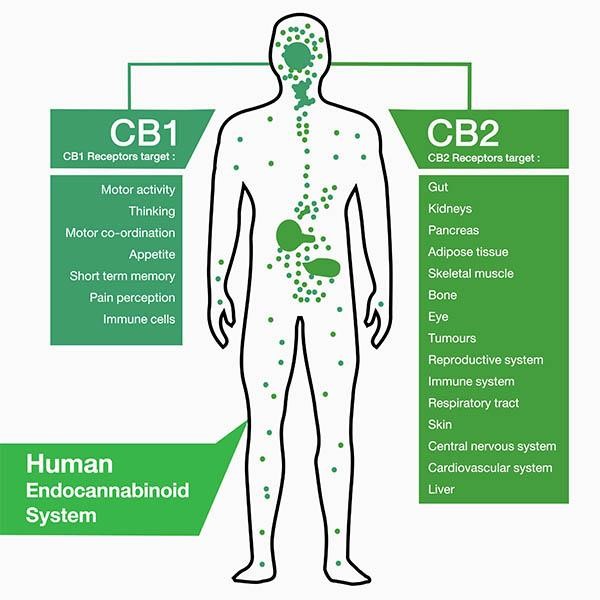
Cannabidiol (CBD) is the non-impairing compound mainly derived from hemp, and to a lesser extent marijuana. Hemp is a species of C. sativa with no more than 0.3% of tetrahydrocannabinol (THC) and can be used to make a variety of products like clothes. Much like hemp, CBD can be utilized in various ways such as foods, oils, cosmetics, and can help with a wide range of physical and mental ailments including pain, depression, in some cases respiratory issues.

Endocannabinoid System
When it comes to the effects CBD has on the body, it is interestingly linked to the endocannabinoid system (ECS). This is the bodily system that assists in regulating memory, pain, sleep, eating, mood, temperature, and inflammatory and immune responses. Within the ECS there are 2 types of cannabinoid receptors; the first type being the CB1 receptor concentrated in the central nervous system that adjust the activity of other systems through immediate feedback like hunger, temperature, or awareness, and the second type being the CB2 receptor playing a crucial role in our immune system and maintaining immune functions. When CBD is introduced to the body, it influences the natural process of the ECS indirectly by increasing the level of endocannabinoids and extending cannabinoid activity, thus promoting brain protection and assistance in fighting off diseases.

Personal Experience
This actually brings up an example of when my mother would have reoccurring episodes of upper respiratory infections and bronchitis for approximately 14 years, causing her to go back and forth to urgent care and doctor offices. Around 9 years ago my father looked into a specific company that handles the manufacturing of pure CBD products from hemp in the form of oil. After he had been taking them for a few months and experienced the benefits they had on his endocannabinoid system and overall health, he suggested to my mother that she try to take the same pure CBD oil. Though she had her reservations she eventually tried it (after doing her research), and to this day she has been diligently ingesting the CBD oil and never experienced a recurrent respiratory issue in 8.5 years. As for myself, I began taking CBD oil on a daily regimen since I was able to experience my mother’s improvements and my illnesses have been few and far between.
Closing Statements
In these closing statements, I would like to acknowledge that while CBD does present bountiful benefits to the body, a lot is still unknown about this compound and can pose certain risks and side effects; for example, liver damage, sleepiness, diarrhea, change in appetite, and change in moods. It is also advised to not take CBD if you are either pregnant, or breastfeeding. And since this is not a miracle drug/solution and everyone’s experience may vary, it is highly suggested that you consult with your healthcare provider before taking CBD for medical reasons so as to not mix with your other medications or cause harm to yourself.
References
CDC. (2025, January 31). About CBD. https://www.cdc.gov/cannabis/about/about-cbd.html.
MedicalNewsToday. (2023, November 17). What is the difference between hemp CBD and cannabis CBD? https://www.medicalnewstoday.com/articles/hemp-cbd-vs-cannabis-cbd#why-cbd.
Harvard Health Publishing. (2021, August 11). The endocannabinoid system: Essential and mysterious. https://www.health.harvard.edu/blog/the-endocannabinoid-system-essential-and-mysterious-202108112569.
Project CBD. (2022, September 5). CBD & the Endocannabinoid System. https://projectcbd.org/science/cbd-the-endocannabinoid-system/.